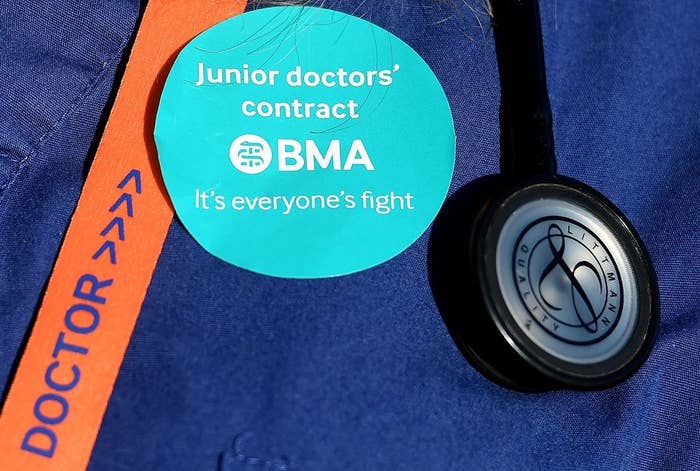The new junior doctors contract, which health secretary Jeremy Hunt plans to impose in August, has now been published in full.

While 90% of the contract had been agreed by the British Medical Association, the issue remains over Saturday pay, which doctors believe should always be paid at a premium rate. In the final contract 1 in 4 Saturdays worked by doctors will be paid at a premium rate.
The final contract was published in full after an equality impact assessment (EIA) was carried out by the government to ensure its terms would not have a greater adverse impact on any particular group.
Following the EIA, some changes to the contract were made to the way in which part-time doctors will see their pay progress.
In particular, the alterations included making part-time pay increases pro-rata so that those doctors could see a proportionate pay progression to those working full-time. Under the previous contract, pay would be increased in line with real-time years of service for both full and part time doctors.
Part-time doctors will also receive premium Saturday pay for 1 in 2 Saturdays worked to reflect a pro-rata version of full-time doctors receiving premium pay for 1 in 4 Saturdays.
Doctors caring for someone with a disability will also receive specific pay protections.
But doctors believe that these measures do not go far enough in protecting pay for women taking maternity leave or working part-time as a result of childcare responsibilities.
Some pay protections for those taking maternity leave were considered by the EIA, which "could be seen as promoting equality of opportunity for women".
However, it was concluded that "such measures would be inconsistent
with the principle of pay based on level of responsibility that underpins the new contract".
While the EIA acknowledged that this may disadvantage some women doctors, particularly lone parents (who are disproportionately female), it concluded that "any indirect adverse effect on women is a proportionate means of achieving a legitimate aim".
The new #juniorcontract takes #womensrights in the workplace back to the Dark Ages. "Achieving a legitimate aim"?!
Dr Rachel Clarke, a junior doctor in Oxford, told BuzzFeed News it was "extraordinary" that "women are treated as collateral damage" for the sake of the "greater good" of the contract.
"It's essentially saying blatant discrimination against one group in society – in this case women – is justifiable because the ultimate aims of this contract make it still worth doing," she said.
"Just think about how outrageous it would be if you substituted women with different groups.
"Suppose the Department of Health was saying adverse affects on Jewish people or Muslims were justifiable because it's a proportionate impact, given how legitimate their aims are. You just can't do that."
Like many doctors, who've expressed fierce opposition to a contract that they already believe to be unsafe for patients and unfair to doctors, Clarke questioned the legitimacy of restructuring junior doctors' pay and working hours to achieve the government's stated aim of creating a "seven-day NHS".
"Is there any greater good coming from this contract anyway?" Clarke said.
"All junior doctors would strongly challenge that although the aim of a seven-day NHS may be laudable, the reality of pretending you can deliver that service with no extra funding is clearly fatuous and will result in doctors being more overstretched, not less, and it will negatively impact patients.
"It would be quite another matter if David Cameron was willing to provide extra funding for the seven-day NHS."
Hmm so it's ok for single mums to be disadvantaged as long as mums with partners get perks.......#juniorcontract
The Department of Health has denied that the contract is in any way discriminatory, and instead called it a "very good deal for doctors and the NHS".
"Our equality impact assessment shows doctors on the new contract will benefit from a fairer pay model that better rewards those who work the most intense and unsocial hours and will improve patient care across seven days," a Department of Health spokesperson said.
"Part-time trainees will now benefit from the same benefits as those working full time, including the same pay protection on a pro-rata basis."
New #juniorcontract found to disadvantage women, but that's a sacrifice govt is willing to make for worsening care https://t.co/eBXZ2sfjYt
As the contract was published, the British Medical Association (BMA) announced that it would launch a judicial review of the government's decision to impose the contract on doctors.
In February, Hunt said that he would impose the contract after negotiations between the two sides collapsed without agreement.
The BMA, which insists it remains open to talks, is planning two strikes – one of emergency care only on 6 and 8 April, and one full walkout on 26 and 27 April – in an attempt to get the government to return to the negotiating table.
"Instead of meaningfully negotiating with the BMA to reach an agreement that would be in the best interest of patients, junior doctors, and the NHS, the government walked away, rejecting a fair and affordable offer by the BMA, and has since continued wilfully ignoring the mounting chorus of concern from doctors, patients, and senior NHS managers – the very people who use and provide NHS services," Dr Johann Malawana, chair of the BMA's Junior Doctors' Committee, said in a statement announcing the judicial review.
"For the sake of patients, doctors, and the future of the NHS the government must put politics to one side, lift the imposition, and actually address, rather than ignore, junior doctor's outstanding concerns."
